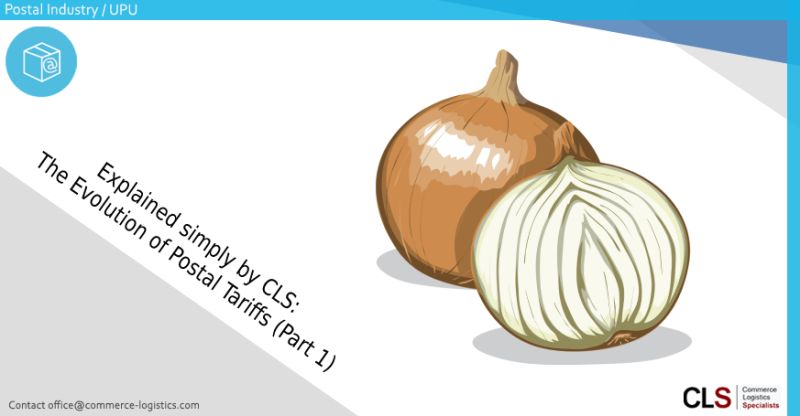Explained simply by CLS: The Evolution of Postal Tariffs (part 1)

𝗘𝘅𝗽𝗹𝗮𝗶𝗻𝗲𝗱 𝘀𝗶𝗺𝗽𝗹𝘆 𝗯𝘆 𝗖𝗟𝗦: 𝗧𝗵𝗲 𝗘𝘃𝗼𝗹𝘂𝘁𝗶𝗼𝗻 𝗼𝗳 𝗣𝗼𝘀𝘁𝗮𝗹 𝗧𝗮𝗿𝗶𝗳𝗳𝘀 (𝗽𝗮𝗿𝘁 𝟭)
The Universal Postal Union (UPU), founded by the Treaty of Bern of 1874, is a specialized agency of the United Nations (#UN). It coordinates #postalpolicies among its #membercountries and their designated postal operators (#DO) to create a single, #global postal territory for the reciprocal #exchange of #postalitems.
𝟭𝟵𝟳𝟭: 𝗧𝗲𝗿𝗺𝗶𝗻𝗮𝗹 𝗗𝘂𝗲𝘀 – 𝗰𝗼𝗺𝗽𝗲𝗻𝘀𝗮𝘁𝗶𝗼𝗻 𝗳𝗲𝗲 𝗳𝗼𝗿 𝗱𝗲𝗹𝗶𝘃𝗲𝗿𝗶𝗻𝗴 𝗳𝗼𝗿𝗲𝗶𝗴𝗻 𝗽𝗼𝘀𝘁𝗮𝗹 𝗶𝘁𝗲𝗺𝘀
In July 1971, the UPU adopted a #system in which the sending country pays the receiving #country for handling, #delivering and (if required) #customsclearance of #international mail. The #rates paid to the DO of the receiving country for these services were called “Terminal Dues” (#TD). Prior to this decision, there was no formalized #compensation for DO for providing these #services, it being assumed that #export and #importflows would largely #balance each other out. This assumption was quickly shown to be unrealistic due to the different stages of #development of the various postal markets.
The TD were not negotiated or contracted between the #postalservices, but instead calculated and decided by the #UPU.
Although, of course, there have always been other parallel #bilateral and #multilateral arrangements in place between DO, the majority of mail #volumes were handled using the #network and clearing model of TD designed specifically for the UPU. This model also provided a basic #digitalinfrastructure for the #exchange of #data related to #tracking, #customsclearance and #clearing (#IT systems such as IPS/CDS/IFS) at #cost.
𝗙𝘂𝗻𝗱𝗮𝗺𝗲𝗻𝘁𝗮𝗹 𝗺𝗮𝗿𝗸𝗲𝘁 𝗱𝗲𝘃𝗲𝗹𝗼𝗽𝗺𝗲𝗻𝘁𝘀 𝗮𝗻𝗱 𝗺𝗼𝗿𝗲 𝗰𝗼𝗺𝗽𝗲𝘁𝗶𝘁𝗶𝗼𝗻
This simple #model soon changed massively.
– The underlying #principle of the UPU model for cross-border mail
– each country’s #DO sends cross-border mail directly to the DO in the destination country for #localdelivery – was bypassed by the direct entry of large (initially mainly European) DO into #foreignmarkets, most of which acquired #customers and #volumes directly in those #markets, often via #commercial subsidiaries (e.g. Deutsche Post – DHL, La Poste – DPD).
– China emerged as the largest #ecommerce market and the largest #exporter of ecommerce #shipments by far. The old UPU model supported #developingcountries by stipulating lower TD in the #destinationcountry. Traditionally a developing country, China had long benefited from these #costadvantages, a #status that was increasingly criticised by #Importingcountries, especially the US.
𝘛𝘰 𝘣𝘦 𝘤𝘰𝘯𝘵𝘪𝘯𝘶𝘦𝘥
Hier geht es zum LinkedIn-Artikel.

Walter Trezek
Document Exchange Network GmbH

